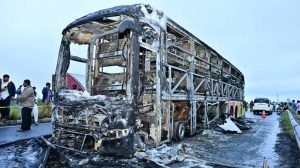Oscar fete in Kampala brings Idi Amin’s ghost back to life
This year, the Oscar buzz has made it all the way to Kampala. On Saturday, none other than Forest Whitaker, a leading contender for best actor

This year, the Oscar buzz has made it all the way to Kampala. On Saturday, none other than Forest Whitaker, a leading contender for best actor, parted a crowd of paparazzi in front of a chic hotel here in Uganda’s capital, and then strutted down a stretch of genuine red carpet for the official opening of “The Last King of Scotland.”
Official being the key word. Because the movie, about the blood-soaked reign of Uganda’s mercurial dictator, Idi Amin, actually arrived a few weeks ago, via shrink-wrapped, bootlegged DVDs shipped in from China. Already, it has created quite a stir in Kampala’s tin-roofed video halls.
Ugandans, struck by Whitaker’s likeness to Amin, are moved by the scenes of an era they would like to forget. Above all else, they are proud that one of this past year’s surprise Hollywood hits was about their country and filmed in their country. Now, nearly five months after its release in the US, it has finally landed here, and landed in style.
Some people, like Davis Kizito, the manager of an orphanage, have seen the film three times. “It was wonderful,” Kizito said as he stepped out of a showing on Friday night with a baby in his arms. “I’m going to watch it again.”
Like others, Kizito said that after all the Rambo movies, Hindi films and second-rate European action flicks he has sat through, it was a joy to see his own country on film and to learn more about an era of Uganda’s past, much of which is still shrouded in mystery.
Amin, a charismatic army sergeant and fearsome boxer, seized power in 1971, promising to shake off the vestiges of colonialism. Instead, he plunged his country into a bloodbath, brutally eliminating his enemies — sometimes quite personally, with a hammer — until he was overthrown in 1979. More than 300,000 people are believed to have been killed.
The movie tracks those events through a fictional relationship with a young, gullible Scottish doctor, but one reason it seems to resonate with audiences here is because so much of it is true. The Amin family, meanwhile, is not happy. Relatives said that the former president, who called himself the “Lord of All the Beasts of the Earth and Fishes of the Sea” and “The Last King of Scotland,” among other things, was not the madman that Whitaker portrayed him as being.
“I don’t care what people say,” said Taban Amin, the eldest of Amin’s more than three dozen children. “Whitaker doesn’t look like my father. He’s too short and his teeth are wrong.” As for the festivities on Saturday, Taban Amin seemed a little hurt that he was not invited.
“I mean, we’re family after all,” he said.
Some Ugandans said the attention surrounding the film was bittersweet, because many people in the West would now associate Uganda with a shameful period of its history.
But those days are over. It took some years after Amin was deposed (he died in exile in Saudi Arabia in 2003) for Uganda to pull itself together, but today it is one of the safest and most stable countries in Africa. It is a leader in the fight against AIDS, and such a reliable Western ally that as soon as donor nations suggested sending African peacekeepers into chaotic Somalia, Uganda was the first to volunteer.
These days, instead of bodies bobbing down the Nile, there are European white-water rafters. Kampala is home to Woolworths and ShopRite and several $300-a-night hotels.
It was only because of Uganda’s stability that the filmmakers from Fox Searchlight Pictures could bring a major entourage here to shoot on location. That is not always the case with African movies.
Originally, this movie was going to be filmed somewhere besides its setting, in South Africa, which has one of the biggest film industries on the continent. But after a research trip to Uganda, the producers decided to “take the movie home,” as they put it.






- 01
- 02
- 03
- 04
- 05

























